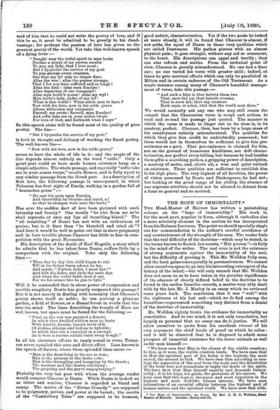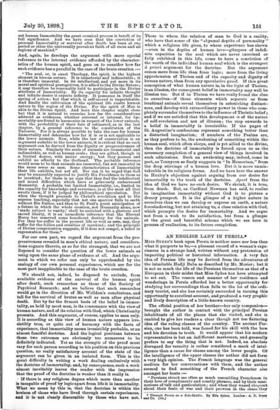THE HOPE OF IMMORTALITY.*
TEE Head-Master of Harrow has written a painstaking volume on the "hope of immortality." His work is, for the most part, popular in form, although it embodies also a more scholarly element in the section he has incorporated from his Hulsean Lectures. The point we should specially single out for commendation is the author's careful avoidance of
any overstatement of the strength of his case. The reader feels that the real difficulty of the doctrine—which may be stated, in
the terms known to Scotch law-courts, "Not proven "—is fully in the mind of the writer. The real crux is not the existence of strong arguments against the immortality of the soul,
but the difficulty of proving it. This Mr. Welldon fully sees, and the book gains consequently in persuasiveness. We cannot allow ourselves space to go into his interesting retrospect of the history of the belief,—bat will only remark that Mr. Welldon
does not seem to us to have taken in the peculiar significance of the absence of clearly defined belief in the doctrine to be found in the earlier Israelite records, a matter very ably dealt with by the late Mr. J. Mozley in an essay which we reviewed some years back. The conviction that it was " well " with the righteous at his last end—which we do find among the
Israelites—represented something very distinct from a denial of the doctrine of immortality.
Mr. Welldon rightly treats the evidence for immortality as cumulative. And to our mind, it is not only cumulative, but
largely so personal that no essay can do it justice. We will allow ourselves to quote from his excellent résumé of his own argument the chief heads of proof on which he relies : and it will be observed that he is disposed to admit some prospect of immortal existence for the lower animals as well
as for man himself :-
"We have seen that Man is the climax of the visible creation ; to him, as it were, the visible creation tends. We have seen that in Man the spiritual part of his being is the highest, the most sacred, the nearest to God. We have seen that according to ana- logy the separation of the soul from the body and the dissolution of the body does not necessitate or imply the death of the spirit. We have seen that Man himself expects and demands Immor- tality; it is his hope, his guide, the postulate of his nature. We have seen that this hope is strongest and most imperious in the highest and most God-like human natures. We have seen intimations of an essential affinity between the highest part of human nature and the spiritual world. We have seen that with-
• The Hope of Immortality; an Essay. By Rev. J. E. C. Welldon, Head Master of Harrow. London: Seeley and Co.
out human Immortality the great cosmical process is bereft of its full significance. And we have seen that the conviction of personal Immortality or survival after death has been at one period or other the universally prevalent faith of all races and all regions of mankind."
And, again, he develops the argument with more special reference to the internal evidence afforded by the character- istics of the human spirit, and goes on to consider how far such evidence has a parallel in the case of the brute creation :—
"The soul, or, in enact Theology, the spirit, is the highest element in human nature. It is immaterial and indissoluble ; it is therefore immortal. In its intellectual, and yet more in its moral and spiritual prerogatives, it is allied to the Divine Nature; it may therefore be reasonably held to participate in the Divine attribute of Immortality. By its capacity for infinite thought and infinite desire it expects infinity. It possesses in itself the spring of action ; but that which is self-moved is imperishable. And finally the cultivation of the spiritual life exalts human nature to the region of the Divine. For the spirit of Man is akin to the Divine Spirit. And here this chapter might close but that it is natural to examine how far the considerations adduced as evidences, whether external or internal, for Im- mortality are found to harmonise in respect of the lower animals, with the probability of their fate if estimated, as in the last chapter, by a general reference to the constitution of the Universe. For it is always possible to take the case for human Immortality and determine how far it is or is not applicable to the lower animals. Now, while the law of conservation is an argument suitable to the lower animals, it is evident that no such argument can be derived from the dignity or progressiveness of their nature. Similarly the souls of animals are immaterial and indissoluble, as well as human souls ; they are gifted, though in a limited degree, with native energy; but they possess and exhibit no affinity to the Godhead. The probable inference would seem to be that animals are immortal, but not immortal in the same sense as men. Some characteristics of Immortality their life exhibits, but not all, Nor can it be urged that God may be reasonably expected to justify His Providence to them as to mankind ; for there is no sign that they feel the intellectual and moral difficulties which have so grievously embarrassed Humanity. A probable but limited Immortality, i.e., limited in the capacity for knowledge and reverence, is at the most all that awaits them, if it be judged by philosophical speculation. But when the thought proceeds to Christ's revelation and to His express teaching, especially that not one sparrow falls to earth without His Father, and then to St. Paul's great anticipation of a future in which the whole creation, not Humanity alone, now `made subject to vanity,' shall be enriched with a glorious and sacred liberty, it is an immediate inference that the Eternal Mercy has reserved some beneficent destiny for the animals. For they too suffer in the present life as well as men, nay, they suffer for the follies and cruelties of mankind ; and the principle of Divine compensation suggests, if it does not compel, a belief in regeneration for them."
For our own part, we regard the argument from the pro- gressiveness revealed in man's ethical nature, and considera- tions cognate thereto, as so far the strongest, that we are not disposed to consider the question of the lower animals as being upon the same plane of evidence at all. And the argu- ment to which we refer can only be apprehended by the analogy of our own personal experiences, which are for the most part inapplicable to the case of the brute creation.
We should not, indeed, be disposed to exclude, from available evidence of the survival of the human spirit after death, such researches as those of the Society of Psychical Research; and we believe that such researches would go in the direction of Mr. Welldon's conclusions, and tell for the survival of brutes as well as men after physical death. Bnt by far the firmest basis of the belief in immor- tality, as held by most men, is its consonance with the view of human nature, and of its relation with God, which Christianity presents. And this argument, of course, applies to man only. It is according as this view of human nature appears irre- sistibly true, or quite out of harmony with the facts of experience, that immortality seems irresistibly probable, or an almost fanciful doctrine. And the logical positions between these two extremes are obviously too numerous to be definitely indicated. Yet as the strength of the proof must vary for each person according to his position on this previous question, no really satisfactory account of the state of the argument can be given in an isolated form. This is the great difficulty in writing a work dealing exclusively with the doctrine of immortality, and, by consequence, such a work almost inevitably leaves the reader with the impression that the proof of the doctrine is weaker than it really is.
If there is any religious dogma which more than another is incapable of proof by logic apart from life it is immortality. What we mean by this is, that the doctrine is within the horizon of those who have lived through certain experiences, and it is not clearly discernible by those who have not. Those to whom the relation of man to God is a reality, who have that sense of the "abysmal depths of personality" which a religious life gives, to whom experience has shown —even in the depths of human love—glimpses of indefi- nite capacities in the soul which are never exercised or fully exhibited in this life, come to have a conviction of the worth of the individual human soul which is the strongest d priori argument for the doctrine. But the argument comes more from life than from logic; more from the living apprehension of Theism and of the capacity and dignity of human nature, than from any speculative proof. If this great conception of what human nature is, in the light of Theism, is an illusion, the consequent belief in immortality may well be illusion too. But if in Theism we have really found the clue to ourselves—if those elements which separate us from irrational animals reveal themselves in astonishing distinct- ness, and develop with extraordinary power in those who com- pletely surrender themselves to the influence of Theistic belief and if we are satisfied that this development is of the nature of self-revelation and not of illusion; the step onwards to a belief in immortality is irresistible. If the pages of St. Augustine's confessions represent something better than a disturbed imagination; if numbers of the Psalms are, as they profess to be, the awakening of something within the- human soul, which often sleeps, and is yet allied to the divine, then the doctrine of immortality is forced upon us as the necessary completion of a general view of things involved in such admissions. Such an awakening may, indeed, come in part, as Tennyson so finely suggests in " In Memoriam," from the deep stirrings of a human love. But it is more unmis- takeable in its religions forms. And we have here the answer to Huxley's objection against arguing from our desire for immortality to the truth of the doctrine. Apart from the idea of God we have no such desire. We shrink, it is true, from death. But, as Cardinal Newman has said, to realise in imagination immortality without God is to picture a dreary prospect. It is the glimpse of a higher nature in ourselves than we can develop or express on earth, a nature foreshadowing, but not attaining to, a close relation with God, which prompts the desire for immortality. And we argue not from a wish to its satisfaction, but from a glimpse at the great and beautiful scheme which we see here in process of realisation, to its future completion.



































 Previous page
Previous page